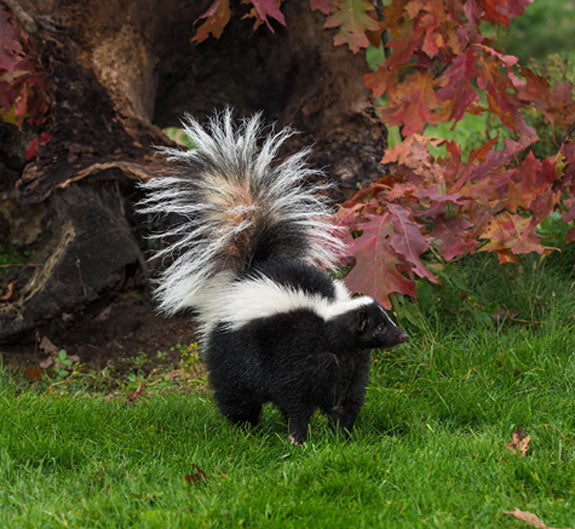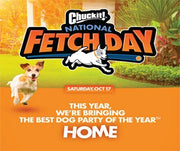How To Deskunk Your Dog

We've all smelt it while driving down the road. You may have even encountered one yourself! The misunderstood skunk. Accidentally coming across and scaring a skunk can cause you or your dog to get sprayed. But that's not even the worst part.
What's the worst part of it, you ask? The scent left behind! It's very potent and can linger for days! For dogs, however, it can be even worse. Since our four-legged friends have a heightened sense of smell, the scent of a skunk is even more potent and can cause unusual behavior if not treated at an early stage. Keep reading for tips on how to treat and get rid of that horrible skunk smell, but first, a brief overview of what we're up against!
THE ANATOMY OF SKUNK SMELL
Commonly found in the United States, Canada, South America, and Mexico, skunks are small, furry creatures renowned for their black and white stripes, and yet, you guessed it, their fairly unpleasant smell. When encountered, it's best not to draw near nor convey any action, as the skunk is known for its distinct defense mechanism: unpleasant odors produced from their excellently developed scent glands. Skunks have two glands, located on each side of the anus. These glands are the ones responsible for producing the skunk's spray, identified as having a mixture of sulfur-containing chemicals, such as thiols, which give off an offensive odor. Thiols give the said spray a certain scent of a burnt tire, garlic, or a sulfur smell.

Before spraying, skunks are known to often charge at an attacker, stomp on its front legs, or hiss. However, if the skunk still feels threatened or frightened, it will shoot a severely smelly and oily substance from the glands underneath their tail with a range of up to 10 feet! Unfortunately for the receiving end of the said substance, the scent can last for days. Luckily, the substance causes no harm whatsoever. Additionally, it's also good to know that, unless threatened, skunks are not aggressive, and won't harm humans.
HOW TO TREAT IT
Incidents like your dog encountering a skunk can happen quite often depending on where you live, so it's best to ensure that your house has some of the most basic de-skunking necessities on hand. Some of them may even already be present in your home!
To de-skunk your dog, common items you'll need are hydrogen peroxide, baking soda, and dish soap. With the right combination, these chemicals can neutralize that skunk smell.
Here's How:
1. Prepare 1 quart of hydrogen peroxide (950ml)
2. Pour the hydrogen peroxide into a large bowl or container
3. Add 1/4 cup of baking soda (59ml) to bowl
4. To help with lifting the oily substance off your pooch, add 1 Tbsp of dish soap (15 ml)
5. Mix the elements in the bowl until the substance becomes slurry
6. Dab using an old cloth and apply the mixture to your pooch wherever needed
7. Once applied, allow the ingredients to work their magic, and let it soak for 5 minutes. The ingredients work by oxygenating the thiols, breaking them up, and attaching more molecules, then neutralizing the sulfur smell. For this method to work well, consider dabbing two applications.
8. After 5 minutes, proceed with rinsing, and repeat as needed
9. For finishing touches, you'll always have the option to proceed with a traditional bath using baby shampoo, to give your dog that refreshing, clean feeling.
THE AFTER EFFECT
In some cases, residual traces of thiols can still be present in your home, especially if it rains, or your dog goes for a swim. It's best to use an environmentally friendly disinfectant spray with your favorite scent to fend off the unpleasant odor. Another excellent option is to take a wet rag, soak it in a mixture of water and fabric softener, and apply it over any affected area of your home. The effects of the thiols will eventually disappear over time.
THE SMELLY CONCLUSION
While there are commercial remedies out there that are readily available, it helps to be in the know of some do-it-yourself tips and tricks when dealing with this stinky problem. Additionally, to do yourself a favor in the future, make sure that your yard does not attract any more skunks. Avoid leaving food outside, and make sure garbage bins and lids are safely secured. Prevention is always much easier and less costly than the cure.
Previous article

Next article

Related posts
View all-

What Can You Use Instead of Cat Litter?
Traditional cat litter is convenient, but it’s not the only option. Many cat owners look for alternatives to reduce waste, save money, or avoid chemicals found in clay-based kitty litter. Some options offer better odor control, while others are more eco-friendly or gentler on a cat’s paws.
Read Article -

How to Keep My Backyard Smelling Fresh
A clean backyard should smell fresh, unlike pet waste, smoke, or mold. Bad smells can linger, especially when dog poop, urine, or food scraps attract flies and bacteria. If your yard has a foul odor, it's time to take action. The first step is cleaning up pet feces, trash, or rotting food. A garden hose can wash away dirt and urine from artificial turf, patios, and decks. To neutralize odor, Use baking soda, white vinegar, and essential oils.
Read Article -

What Supplies Do First-Time Cat Owners Need?
Bringing home a new cat is exciting, but making them feel safe and comfortable takes more than love. First-time cat owners must prepare with the right supplies to ensure a smooth transition. From a litter box to cat food and a warm bed, having the basics ready can help your new kitty settle in faster. This guide covers everything a new cat owner needs to make their new pet feel at home.
Read Article



